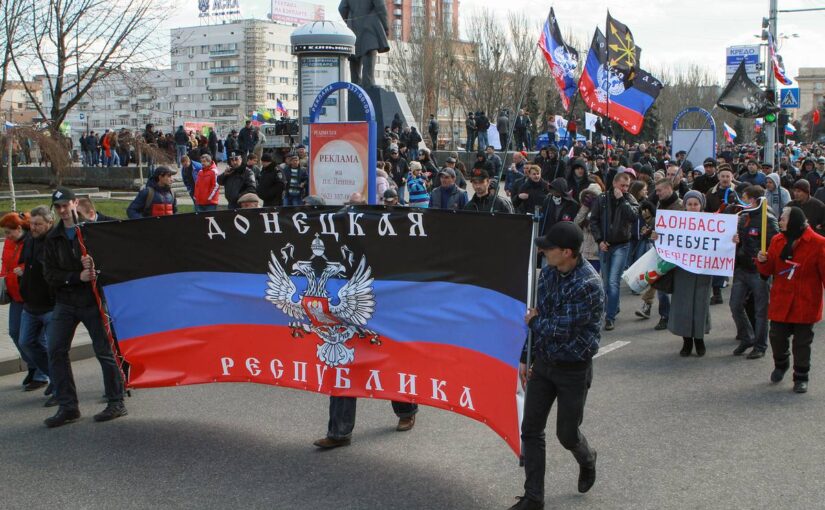The following article by Carlos Martinez, giving an overview of the causes of the escalating crisis in Ukraine, was originally published by CGTN on 26 February 2022.
Contrary to the superficial analysis in much of the Western media, the escalating crisis in Ukraine is not a product of any psychopathology on the part of Vladimir Putin. Nor has it emerged out of thin air. It represents the culmination of a storm that has been brewing for many years.
There are two key components of this situation that are crucial to understand.
First is the issue of Russia’s security. During talks with Soviet President Mikhail Gorbachev and his team about the reunification of Germany in 1989-90, Western leaders made firm commitments that NATO would not seek to extend its borders eastward and that Russia’s legitimate security concerns would be taken seriously. Yet in the event, as Chinese Foreign Ministry spokesperson Hua Chunying has commented, “the U.S. drove five waves of NATO expansion eastward all the way to Russia’s doorstep and deployed advanced offensive strategic weapons,” in a clear breach of the commitments made by George HW Bush and Helmut Kohl. Since the 1990s, 14 states in Central and Eastern Europe have joined NATO.
In 2014, the U.S. and EU were deeply involved in a coup d’etat in Ukraine which brought an anti-Russia and pro-West government into being. This government has been actively pursuing NATO membership, has participated in joint military exercises with NATO, and has been the recipient of hundreds of millions of dollars’ worth of sophisticated weaponry from the U.S.
It’s not difficult to understand why Russia would be concerned about this situation. As Professor Jeffrey Sachs commented in the Financial Times recently: “The U.S. would not be very happy were Mexico to join a China-led military alliance… Neither the U.S. nor Russia wants the other’s military on their doorstep.”
Russia and Ukraine share a land border of approximately 2,000 kilometers. Russia is justifiably wary of Ukraine becoming a member of a nuclear pact that has explicitly identified Russia as a strategic enemy. While NATO is sometimes painted in the West as a defensive alliance, its actions in Iraq, Libya, Afghanistan and Yugoslavia – including, notoriously, bombing the Chinese Embassy – tell a very different story.
The second fundamental issue is that of the oppression of the peoples of the Donbas region of eastern Ukraine. The majority of the population of this region is ethnically Russian; the people speak Russian as their first language and are culturally oriented towards Russia rather than the West. These people rejected the anti-Russian Kyiv government installed in 2014 and unilaterally declared independence. In referendums held that year, Donetsk and Luhansk voted 89 percent and 97 percent respectively in favor of seceding from Ukraine.
Refusing to recognize the voting results or to develop an offer of autonomy within a federal system, the central authorities in Ukraine unleashed a vicious war on Donbas, conducted by the Ukrainian army as well as by paramilitary gangs with neo-Nazi affiliations. There have been daily shelling attacks on Donbas since that time, with in excess of 13,000 killed, many of them civilians.
This campaign of terror has been accompanied by an attack on the Russian language and culture. Russian has been banned from being used in schools and other official contexts. The ranks of the civil service have been largely purged of Russian speakers or people who might be considered to be pro-Russian. To be somewhat provocative, all this time Western journalists and politicians have been searching for a fictional cultural genocide in China’s Xinjiang Uygur Autonomous Region when in fact they should have been paying attention to a real cultural genocide in Ukraine.
Russia’s diplomatic efforts since 2014 have therefore been focused on resolving these two core issues: protecting the Russian speaking population of the Donbas; and protecting Russia’s borders from NATO aggression. On both issues, Washington and Kyiv have proven intransigent. Encouraged by the U.S., Ukraine has refused to implement the Minsk-2 agreement and to respect the rights of the peoples of eastern Ukraine. Meanwhile, the Kyiv administration has continued to clamor for membership of NATO, while the U.S. has been working towards incorporating Ukraine into NATO.
A U.S. government that genuinely preferred peace over war, that was willing to opt for multipolarity over hegemony, would have been able to lead the resolution of these issues. But in reality the U.S. – whether led by Obama, Trump or Biden – has refused even the smallest concession.
This is the context in which Russia, on February 21, recognized Donetsk and Luhansk “republics” and, two days later, launched a special military operation to wipe out Ukraine’s military installations – which pose a threat to both the peoples of the Donbas and to Russia. Putin assured the world that Russia has “no plans to occupy the Ukrainian territories.”
Such an escalation is of course worrying. Even with limited objectives, military operations can easily get out of control. But it is clear that the fundamental responsibility here lies with the West – primarily with the governments in Washington, London and Kyiv, which have consistently failed to address Russia’s legitimate security concerns.
People around the world are asking: why does NATO still exist? What is the justification for an aggressive, exclusive, nuclear-first-use military alliance that exists outside the structures of the United Nations? The frank answer is that NATO, having served as the military architecture of the Cold War from 1951 to 1991, is now the core of the military architecture of a new Cold War. Together with AUKUS and the Quad, NATO forms a global containment mechanism targeting Russia, China, Iran and all other countries working towards a multipolar future.
We can only hope that the crisis in Ukraine is resolved swiftly and with a minimum of casualties and destruction. NATO should commit to ending its expansion. Ukraine should commit to neutrality. On such a basis, this terrible crisis can be resolved.

